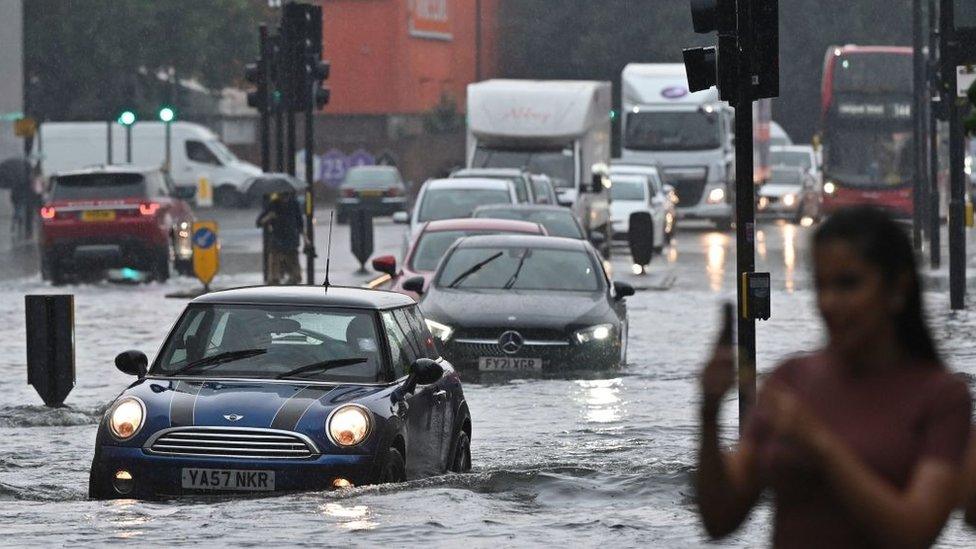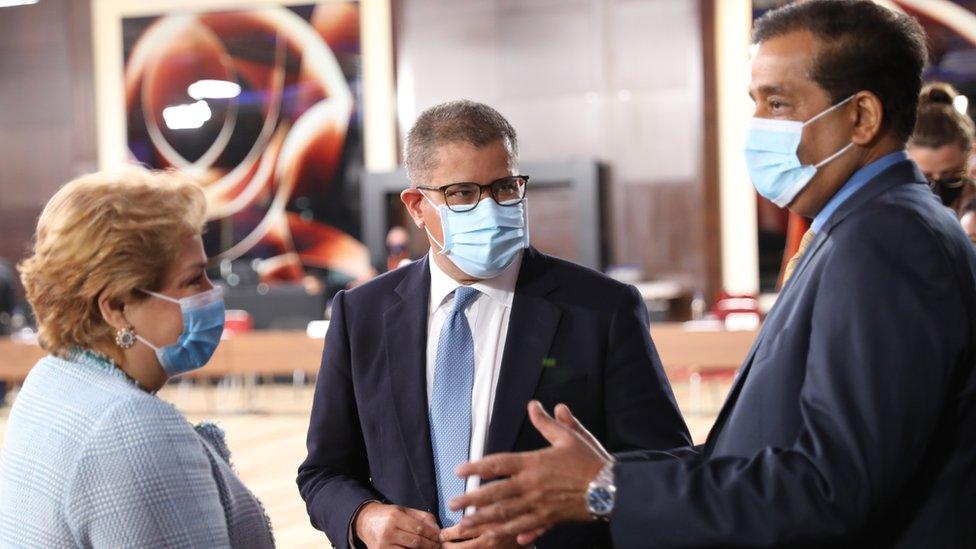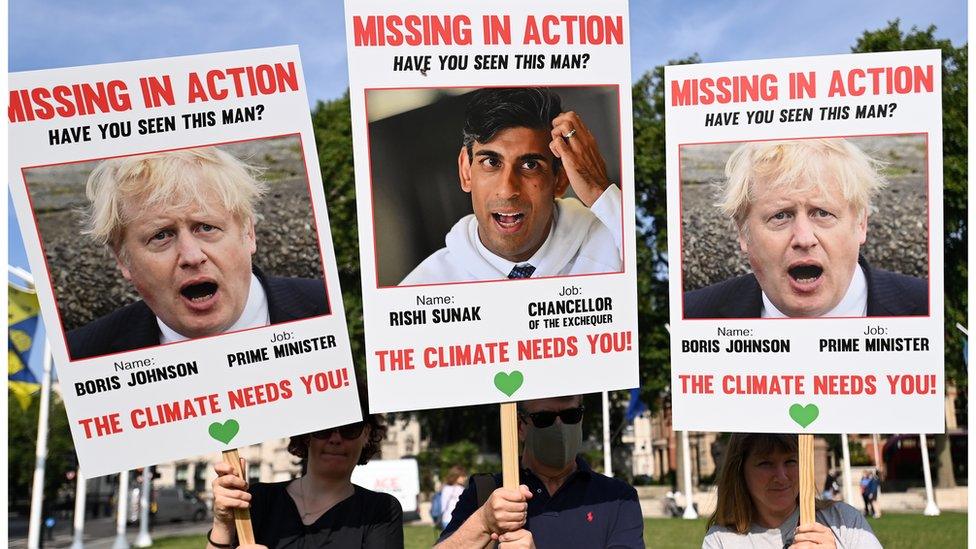COP26 climate summit president says progress made, but not enough
- Published

Intense downpours caused flooding in London on the weekend that ministers arrived for climate talks
The first in-person meeting of climate ministers in 18 months has seen some tentative progress, says the UK minister who will lead the Glasgow COP26 meeting.
Alok Sharma said that the countries aligned more closely on climate issues but on some key matters they were "not yet close enough".
One of the outstanding questions is the phasing out of coal for energy.
Continued use was incompatible with a key climate target, Mr Sharma said.
Representatives from 51 countries attended the informal gathering in London over the weekend.
COP26 will aim to raise ambition on tackling climate change - in order to avoid far-reaching consequences for the planet.
With just three months until the Glasgow summit, there has been a flurry of scientific and diplomatic activity in recent days related to climate change.
Scientists from the Intergovernmental Panel on Climate Change (IPCC) - the UN's climate science body - have begun two weeks of discussions to try and agree a new report on the state of the global climate.
On the political front, environment ministers from the G20 group of nations, external met in Naples, Italy, last week to try and make progress on questions such as the elimination of coal from power generation.
While there was strong support for the step, it was opposed by China and India.
There was also dissent from some G20 countries on strengthening the language around the 1.5C temperature goal in the Paris agreement, drawn up in 2015. Scientists say that we must keep the global rise in temperatures to 1.5C since industrial times if we are to avoid the most dangerous effects of warming.
The planet has already warmed around 1.2C compared to the pre-industrial era.
However, the nations did agree that they would all submit new climate pledges before the Glasgow meeting.

UK Minister Alok Sharma, centre, is set to chair the key climate conference in Glasgow
Many of these same ministers have spent the weekend in London, at an informal gathering organised by the UK to discuss some of the key issues that will need resolving before COP26.
In all, representatives from 51 countries including the US, India, China took part in this meeting along with nations hugely vulnerable to rising temperatures such as Rwanda, Costa Rica and the Marshall Islands.
One major step forward, apart from the discussions, was that the many of the participants attended in person.
"This was the most important meeting since COP25 in Madrid (in 2019), and it turned out to be an extremely productive meeting," said Patricia Espinosa, executive secretary of the UNFCCC at a news conference.
Mr Sharma said there was a sense among participants that the lived experience of climate change was bringing home to people the urgency of the situation.
"I sense this sense of common endeavour, and a shared desire to address the climate crisis before us," said Mr Sharma, who will chair the conference in Glasgow.
"I do think we made progress over these two days, however the issues we discussed are complex, and there are still significant differences that persist. We have moved closer together over the past few days, but still on these vital issues, we are not yet close enough."
Mr Sharma said that keeping the 1.5C temperature goal alive is a key outcome for Glasgow.
This will require the world to get to net zero emissions by the middle of this century and would need countries to pursue substantial emissions cuts over the next decade.
Net zero means that any greenhouse gas emissions that can't be avoided through the use of clean technology by 2050 will either have to be buried using the technology of carbon capture and storage, or soaked up by plants and soils.
But substantial obstacles to achieving this goal remain, of which the rapid phasing out of coal is key.
"We weren't able to get every country in the G20 to agree to language on unabated coal phase out, it's a simple as that," Mr Sharma told a news conference.

Climate protestors say the UK government is not doing enough with less than 100 days until the Glasgow COP
"For me that was very disappointing and very disappointing for those countries that are supporting of this policy."
Mr Sharma said there had been some progress on issues such as climate finance. The richer world promised back in 2009 that there would be $100bn for poorer countries from 2020 to help them cope with climate change.
Securing the cash, even a year late, is seen as a crucial question of trust. Without it, there will be little progress on questions of substance in Glasgow.
Other participants felt that the face-to-face talks had been an improvement over the virtual meetings that have taken place for the last year-and-a-half.
"At the UK's ministerial [meeting], the message from small island developing states appeared to be well received. This provides a level of hope that the major emitters are beginning to understand their responsibilities and should be committed to keeping the 1.5C goal in reach," stated Minister Molwyn Joseph from Antigua and Barbuda.
"Realistically, this is going to require that we continue to press for declared commitments by the major emitters ahead of COP26 in Glasgow," he added.
There are also a range of issues relating to the workings of the Paris agreement that have not yet been satisfactorily resolved, such as the role of carbon markets, and common time frames for reporting progress. Mr Sharma said some small steps had been agreed on these questions.
Among the ministers attending the meeting was US Climate Envoy John Kerry.
He warned recently that countries like China will have to do more heavy lifting when it comes to cutting carbon, saying that without greater efforts from Beijing, the idea of keeping the rise in temperatures under 1.5C was "essentially impossible".
Follow Matt on Twitter, external.